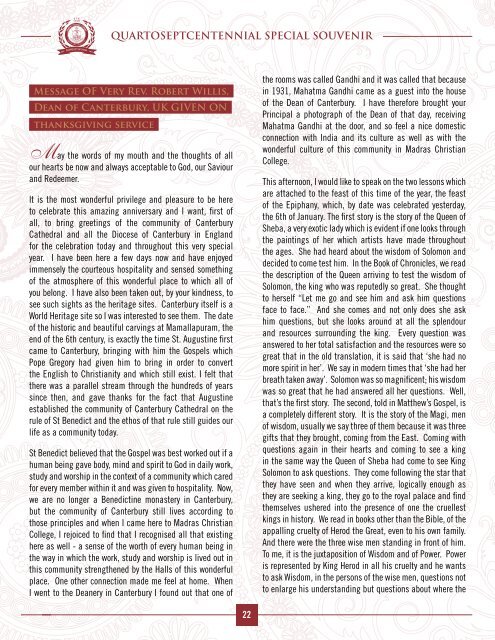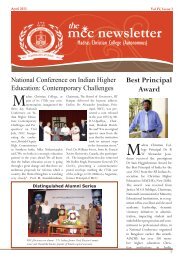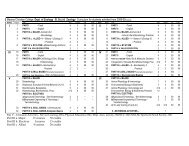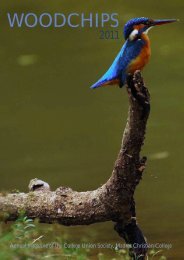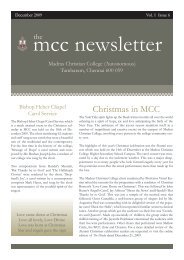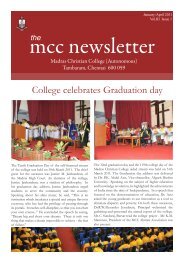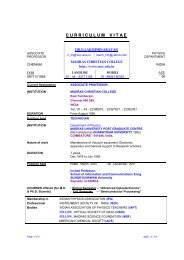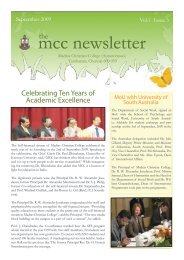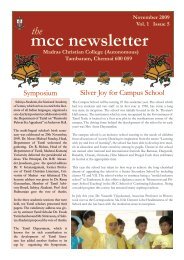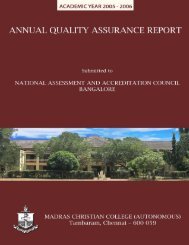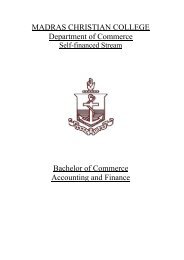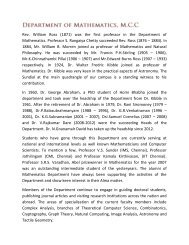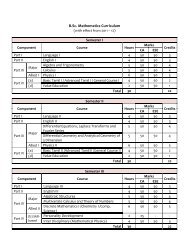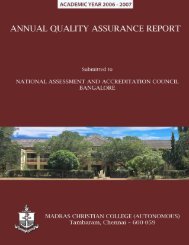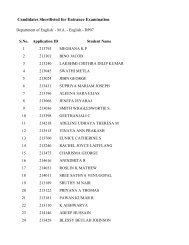AUTONOMOUS - Madras Christian College
AUTONOMOUS - Madras Christian College
AUTONOMOUS - Madras Christian College
You also want an ePaper? Increase the reach of your titles
YUMPU automatically turns print PDFs into web optimized ePapers that Google loves.
QUARTOSEPTCENTENNIAL SPECIAL SOUVENIRMessage OF Very Rev. Robert Willis,Dean of Canterbury, UK GIVEN ONthanksgiving serviceMay the words of my mouth and the thoughts of allour hearts be now and always acceptable to God, our Saviourand Redeemer.It is the most wonderful privilege and pleasure to be hereto celebrate this amazing anniversary and I want, first ofall, to bring greetings of the community of CanterburyCathedral and all the Diocese of Canterbury in Englandfor the celebration today and throughout this very specialyear. I have been here a few days now and have enjoyedimmensely the courteous hospitality and sensed somethingof the atmosphere of this wonderful place to which all ofyou belong. I have also been taken out, by your kindness, tosee such sights as the heritage sites. Canterbury itself is aWorld Heritage site so I was interested to see them. The dateof the historic and beautiful carvings at Mamallapuram, theend of the 6th century, is exactly the time St. Augustine firstcame to Canterbury, bringing with him the Gospels whichPope Gregory had given him to bring in order to convertthe English to <strong>Christian</strong>ity and which still exist. I felt thatthere was a parallel stream through the hundreds of yearssince then, and gave thanks for the fact that Augustineestablished the community of Canterbury Cathedral on therule of St Benedict and the ethos of that rule still guides ourlife as a community today.St Benedict believed that the Gospel was best worked out if ahuman being gave body, mind and spirit to God in daily work,study and worship in the context of a community which caredfor every member within it and was given to hospitality. Now,we are no longer a Benedictine monastery in Canterbury,but the community of Canterbury still lives according tothose principles and when I came here to <strong>Madras</strong> <strong>Christian</strong><strong>College</strong>, I rejoiced to find that I recognised all that existinghere as well - a sense of the worth of every human being inthe way in which the work, study and worship is lived out inthis community strengthened by the Halls of this wonderfulplace. One other connection made me feel at home. WhenI went to the Deanery in Canterbury I found out that one ofthe rooms was called Gandhi and it was called that becausein 1931, Mahatma Gandhi came as a guest into the houseof the Dean of Canterbury. I have therefore brought yourPrincipal a photograph of the Dean of that day, receivingMahatma Gandhi at the door, and so feel a nice domesticconnection with India and its culture as well as with thewonderful culture of this community in <strong>Madras</strong> <strong>Christian</strong><strong>College</strong>.This afternoon, I would like to speak on the two lessons whichare attached to the feast of this time of the year, the feastof the Epiphany, which, by date was celebrated yesterday,the 6th of January. The first story is the story of the Queen ofSheba, a very exotic lady which is evident if one looks throughthe paintings of her which artists have made throughoutthe ages. She had heard about the wisdom of Solomon anddecided to come test him. In the Book of Chronicles, we readthe description of the Queen arriving to test the wisdom ofSolomon, the king who was reputedly so great. She thoughtto herself “Let me go and see him and ask him questionsface to face.” And she comes and not only does she askhim questions, but she looks around at all the splendourand resources surrounding the king. Every question wasanswered to her total satisfaction and the resources were sogreat that in the old translation, it is said that ‘she had nomore spirit in her’. We say in modern times that ‘she had herbreath taken away’. Solomon was so magnificent; his wisdomwas so great that he had answered all her questions. Well,that’s the first story. The second, told in Matthew’s Gospel, isa completely different story. It is the story of the Magi, menof wisdom, usually we say three of them because it was threegifts that they brought, coming from the East. Coming withquestions again in their hearts and coming to see a kingin the same way the Queen of Sheba had come to see KingSolomon to ask questions. They come following the star thatthey have seen and when they arrive, logically enough asthey are seeking a king, they go to the royal palace and findthemselves ushered into the presence of one the cruellestkings in history. We read in books other than the Bible, of theappalling cruelty of Herod the Great, even to his own family.And there were the three wise men standing in front of him.To me, it is the juxtaposition of Wisdom and of Power. Poweris represented by King Herod in all his cruelty and he wantsto ask Wisdom, in the persons of the wise men, questions notto enlarge his understanding but questions about where the22


